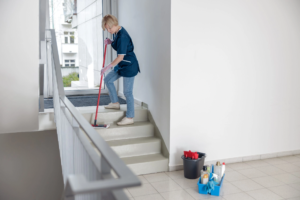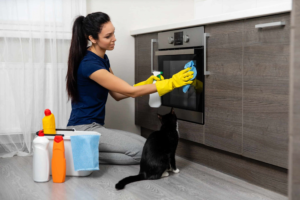[fsn_row][fsn_column width=”12″][fsn_text]
Cleaning houses is a common service sought by homeowners and busy individuals alike. Maintaining a clean and organized living space contributes to a healthier and more comfortable environment. However, when starting a house cleaning business or offering cleaning services professionally, you might wonder, “Do I need a license to clean houses?”
In this article, we will explore the topic of house cleaning licenses and provide insights to help you navigate this aspect of the industry.
Introduction
Cleaning, whether residential or commercial, is an essential service that promotes hygiene and overall well-being. Many professions require licenses to ensure that practitioners meet certain standards and regulations. So, where does house cleaning fit in?
Understanding Licensing
To comprehend the need for a house cleaning license, it’s crucial to understand the concept of licensing in general. Licenses are legal permissions granted by regulatory authorities that allow individuals or businesses to perform specific activities within a given jurisdiction. The primary purpose of licenses is to protect consumers, ensure quality services, and maintain public safety.
Licenses come in various forms, depending on the industry and location. Professions like medicine, law, and engineering typically require extensive education, training, and licensing to ensure public safety. However, for other occupations, the requirements may vary.
House Cleaning License
Is a License Required for House Cleaning?
In most jurisdictions, a specific license for general residential house cleaning is not mandatory. Unlike professions that involve specialized skills or potential risks to public health and safety, such as electrical work or plumbing, house cleaning is generally considered a low-risk occupation. However, it’s important to note that requirements can vary depending on your location.
Legal Requirements for House Cleaning Businesses
While a license may not be required for individual house cleaners, operating a house cleaning business often involves additional considerations. Setting up a legitimate cleaning company might require you to obtain a business license or register your business with local authorities. It is essential to research and comply with the legal requirements specific to your area.
Exceptions and Variations
Keep in mind that certain exceptions and variations exist within the house cleaning industry. For instance, some municipalities may require a license for specialized cleaning services such as carpet cleaning or biohazard cleanup. Additionally, if you plan to offer cleaning services to commercial establishments or work in healthcare facilities, there may be specific licensing or certification requirements.
Benefits of Having a License
While a general house cleaning license may not be obligatory, obtaining one can offer several advantages for both you and your clients.
Credibility and Trustworthiness
Having a license can enhance your credibility as a professional cleaner. It signifies that you have met certain standards, possess relevant skills, and are committed to providing quality service. Clients often prefer to hire licensed cleaners as they perceive them to be more trustworthy and reliable.
Consumer Protection
Licensing provides a layer of protection for consumers. It ensures that cleaners adhere to certain guidelines and ethical standards and potentially have insurance coverage. In the event of any issues or damages, licensed cleaners are more likely to have proper mechanisms in place to address them.
Competitive Advantage
In a competitive market, a house cleaning license can give you an edge over unlicensed individuals or businesses. It demonstrates your commitment to professionalism and differentiates you from uncertified competitors. Clients are more likely to choose licensed cleaners when comparing service providers.
Access to Resources and Training
Obtaining a license may provide access to additional resources, training programs, and industry networks. Licensing authorities often offer educational materials, workshops, and opportunities to stay updated on the latest cleaning techniques and best practices. This access can further improve your skills and enhance your service quality.
Drawbacks of Not Having a License
While a license may not be mandatory, there are potential drawbacks to operating without one.
Potential Legal Issues
Operating a house cleaning business without the necessary licenses or permits can result in legal consequences. Depending on your jurisdiction, you might face fines, penalties, or even have your business shut down. It’s essential to understand and comply with local regulations to avoid such complications.
Lack of Credibility
Without a license, you may struggle to gain the trust and credibility of potential clients. Some customers may have reservations about hiring an unlicensed cleaner due to concerns about quality, reliability, or safety. Establishing credibility in a competitive market can be more challenging without the backing of a license.
Limited Opportunities
Certain clients or organizations may have policies or contractual requirements that only permit them to hire licensed cleaners. By not having a license, you may miss out on potential business opportunities or partnerships. Being licensed widens your client base and allows you to cater to a broader range of customers.
Obtaining a House Cleaning License
If you decide to obtain a house cleaning license, here are some general steps to help you navigate the process:
Researching Local Regulations
Start by researching the specific regulations and requirements in your locality. Check with your local business licensing office, municipality, or relevant regulatory agency to understand the guidelines you need to follow.
Applying for a License
Once you have a clear understanding of the requirements, submit an application for the appropriate license or permit. Prepare any necessary documentation, such as identification, proof of residence, and business information. Follow the application procedures outlined by the licensing authority.
Meeting the Requirements
Depending on your jurisdiction, you may need to fulfill certain criteria to obtain a house cleaning license. This may include background checks, proof of liability insurance, or completion of specific training programs. Ensure that you meet all the requirements within the specified timeframe.
Cost and Renewal
Consider the cost associated with obtaining a house cleaning license. Licensing fees can vary, so it’s essential to factor in this expense when planning your business budget. Additionally, licenses often have expiration dates and require renewal at regular intervals. Familiarize yourself with the renewal process to maintain compliance.
Other Considerations
In addition to obtaining a license, there are other aspects to consider when starting or operating a house cleaning business.
Insurance Coverage
While not directly related to licensing, having insurance coverage is crucial for protecting your business and clients. General liability insurance can safeguard you against accidents, damages, or legal claims that may arise during your cleaning operations. Consult with an insurance professional to determine the coverage that best suits your needs.
Bonding and Certification
Some clients may prefer to hire bonded cleaners. Bonding provides financial protection to clients in case of theft or damage caused by the cleaner. Certification from reputable cleaning associations or organizations can also boost your credentials and reassure clients of your expertise.
Specialized Cleaning Services
Consider whether you plan to offer specialized cleaning services beyond general house cleaning. As mentioned earlier, some services, such as carpet cleaning or window cleaning at heights, may require additional certifications or licenses. Assess the market demand for such services and determine if obtaining specialized licenses is beneficial for your business.
Safety Regulations
Ensure that you are familiar with safety regulations related to cleaning chemicals, equipment usage, and occupational health. Adhering to these regulations not only protects you and your clients but also demonstrates your commitment to maintaining a safe working environment.
Should Everyone Get a License?
Deciding whether to obtain a house cleaning license is a personal choice influenced by various factors.
Personal Choice and Circumstances
Consider your long-term goals, business plans, and personal circumstances. Assess the benefits and drawbacks outlined earlier, keeping in mind the requirements and expectations of your target market. Evaluate how licensing aligns with your aspirations and if it provides added value to your business.
Market Demand and Competition
Research the market demand for licensed house cleaners in your area. Analyze the competition and understand the preferences of potential clients. If there is a strong demand for licensed cleaners and few competitors fulfill that requirement, obtaining a license may give you a competitive advantage.
Weighing the Pros and Cons
Weigh the pros and cons carefully before making a decision. Consider the financial investment, time commitment, and ongoing responsibilities associated with obtaining and maintaining a license. Compare these factors against the potential benefits and your specific business objectives.
Conclusion
While a specific license for general house cleaning is not always required, obtaining one can offer several benefits. A house cleaning license enhances credibility, provides consumer protection, and can give you a competitive advantage. However, not having a license may lead to legal issues, limited opportunities, and challenges in establishing credibility. Before deciding whether to pursue a license, consider your personal circumstances, and market demand, and weigh the pros and cons. Remember to comply with any local regulations and always prioritize the safety and satisfaction of your clients.
Need professional help to clean your house? Contact PROCLEAN today! We provide professional house cleaning services for residential and commercial properties. Our team of experienced cleaners is licensed, insured, and bonded for your peace of mind. Book a service today!
Wondering “Why hire a commercial cleaning service?” Click to unlock the benefits and let us take care of all your housekeeping needs so you can relax in a clean and comfortable environment. We look forward to serving you soon!
FAQs: Do I need a License to Clean Houses
Do I need a license for a small house-cleaning business?
In most jurisdictions, a general house cleaning license is not mandatory for individual cleaners. However, it’s important to research and comply with any local regulations and obtain any necessary business licenses or permits.
Are there any exceptions for independent cleaners?
Exceptions may exist for specialized cleaning services or when offering cleaning services to commercial establishments. Research the specific requirements in your area to ensure compliance.
What are the benefits of having a license?
Having a house cleaning license can enhance credibility, provide consumer protection, offer a competitive advantage, and provide access to additional resources and training opportunities.
Can I clean houses without a license?
Generally, you can clean houses without a specific license for general house cleaning. However, certain legal requirements may apply, such as obtaining a business license or complying with local regulations.
How much does it cost to obtain a house cleaning license?
The cost of obtaining a house cleaning license can vary depending on your location and the specific requirements. Research the licensing fees and associated expenses in your area to budget accordingly.
[/fsn_text][/fsn_column][/fsn_row]





